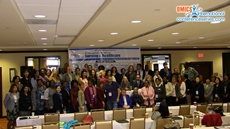
Zafar Iqbal Channa
University of Health Sciences, Pakistan
Title: Barriers to participation in non formal CNE programs among hospital nurses in Pakistan
Biography
Biography: Zafar Iqbal Channa
Abstract
Degree or license is not the end point of education aft er basic nursing study. Apparently, basic nursing education for practice becomes obsolete within fi ve to ten years aft er graduation. Th is obsolescence can lead to the poor performance of nurses in clinical practice. Rapid scientifi c and technological discoveries proved that increased demands of specialized nursing knowledge and skills can be replaced by engaging nurses in a set amount of continuing nursing education (CNE) activities for effi cient and eff ective quality care. Study was designed to investigate most infl uential and predicting barriers impeding nurses’ participation in non-formal CNE programs and suggest strategies to increase nurses’ participation in such activities. Descriptive cross sectional study designed used and data were collected by applying convenience sampling technique of three hundred (n=300) nurses. Modifi ed research instrument “Barriers to Participation Questionnaire (BPQ)” was used to collect data aft er pilot testing α=0.861. Study results showed as “lower the mean score in each type of barrier” higher the barrier is measured. Th erefore, administrative barrier was found higher and most prevalent barrier with the mean score 2.19±0.83 and work-related barrier was found predicting barrier than fi nancial barriers with the mean score of 2.53±0.85. Financial, family and personal barriers were less impending barriers in nurses’ participation of the CNE programs. To keep nurses abreast with advanced knowledge in changing health care environment, more opportunities of non-formal CNE programs should be provided both in and outside of the hospital or organization.



